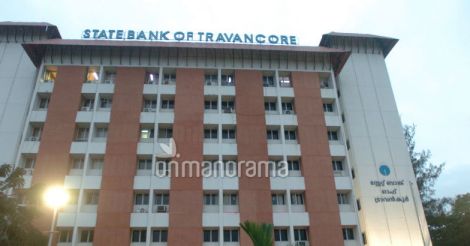The proposal to merge SBT with SBI has already led to much debate and discussion. While those who favour the merger feel that it would lead to better services, larger banking network, better technology and so on, those who oppose it feel that SBT would lose its regional flavour post merger. They also fear about layoffs, branch closures and financial exclusion of the poor.
While all these arguments may sound reasonable at first glance, looking deeply would prove that the merging of the two entities would not cause any significant changes to the customers of SBT in the state.
The SBI influences the operation and functioning of SBT, which is one of its associate banks. About 80 per cent of SBT's shares are with SBI. The SBI chair is the chair of the board of directors of SBT. SBI decides the appointment of the MD, majority of the board and top officials of SBT. This means that the operational freedom that SBT has is quite limited.
It needs to be understood that SBT officials in its board of directors are not in a position to review or veto decisions taken by representatives of SBI in the board. Further, the SBI has complete control over important functions of SBT such as asset management, debt handling, opening of new branches, hierarchy, technology, project implementation, training, annual project preparation and so on. Associate banks of SBI cannot borrow at rates lower than what is specified by the SBI and they do not have a chance to compete in the open markets. While the SBI insists that it only provides directions and suggestions aimed at better performance to associate banks, in effect they are more like commands and directives.
In spite of all these hurdles and conflicts of interest, SBT has been able to make a profit. However, after SBI started its regional headquarters in Kerala, SBT's business was more affected than other PSU or private sector banks. By opening SBI branches all over the state, the operations of SBT were curbed to a large extent in the state.
Those who say that the merger of the two would destroy the regional flavour of SBT cannot explain why SBI would be incompetent to provide the same services post merger. Similarly, there is no material in the argument that the merger would lead to financial exclusion. On the other hand, those who claim better performance and so on also cannot claim so because whatever advances that SBT has made now, have been provided by SBI. Similarly all failures of SBT, if any, must be attributed to SBI. The one major consequence of the merger is that many SBT branches would be closed all over the state. The merger would also see downgrades in posts, retrenchment, branch closures etc because SBI would have the final say in all these. On the other hand, SBI officials would have more benefits because they would get preference in promotions and transfers.
Other than the benefits and losses that employees of both banks would have to bear, the merger would not significantly affect customers because the merger is completely technical in nature; indirect control by the SBI would now become very direct.
(The author is a former GM of the Reserve Bank of India)

























 (Representative image)
(Representative image)